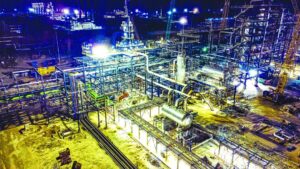
The international oil cartel is a formidable force, capable of crushing any new entrants into the oil market, such as Dangote Refinery in Nigeria. Known as “the Seven Sisters,” these powerful entities dominated offshore oil businesses and the downstream sector. In the early 1980s, they monopolized the supply of refined petroleum products in Nigeria, with local refineries distributing products through NNPC’s depots across the country.
Crude oil was transported via NNPC’s pipeline to the refineries, where it was processed into various grades of petroleum products such as PMS, DPK, AGO, LPFO, and HPFO. The output was then analyzed by the Product Marketing Department of NNPC and allocated to the Seven Sisters for distribution to their retail outlets. However, the introduction of Petroleum Independent Marketers in the mid-1980s gradually diminished their dominance.
Unfortunately, the refineries began to malfunction, and their turnaround maintenance was compromised by awarding contracts to some of the Seven Sisters who lacked the technology and expertise required. For example, while the Kaduna Refinery was constructed by Chioda, a Japanese company, its maintenance was handed to Total, a French company and one of the Seven Sisters.
This mismanagement led to the complete and total malfunctioning of all the refineries in Nigeria, opening the floodgate for importing refined petroleum products with no end in sight. The Seven Sisters, also involved in crude oil exploration, had agreements with NNPC dictating the exploration and sale of crude oil, giving them an upper hand in sale-back agreements for supplying refined petroleum products. The volatility of oil prices in the international market further entrenched the subsidy regime, negatively impacting petroleum product prices for Nigerian consumers.
The entrance of Dangote Refinery into the market poses a serious threat to the dominance of the international oil cartel and their local collaborators. It signals the end of the subsidy regime, blocks financial leakages, and ensures Nigeria gets value for its investments. Dangote Refinery represents the control of Nigeria’s oil industry by an indigenous investor who previously wrested control of the cement industry from multinationals like WAPCO and Lafarge.
The battle, unfortunately, has involved the government through NNPC, which has stifled the capability and capacity of indigenous investors willing to take risks to save Nigeria from neocolonialism. If Dangote is accused of becoming a monopoly, what stops others from entering the market? BUA Group is building a refinery in Akwa Ibom State, NNPC is repairing its three refineries, and other modular refineries are operational. Thus, accusations of Dangote’s monopoly are unfounded.
Instead of selling his stake to NNPC, Dangote should list the company on the Nigerian Exchange and offer shares to interested investors, including NNPC, through an IPO or private placement. This move would strengthen the capital market and boost the financial sector. Engaging a reputable financial consulting firm like Alpine Invest, with a track record in financial advisory services, can ensure proper valuation and sale of at least 49% of Dangote’s holdings to new shareholders at a premium. The capital gains can be reinvested elsewhere, reducing the risks associated with Dangote’s total control and alleviating executive stress.
It is regrettable and distressing that an indigenous investor could be pushed to the brink in his attempt to create a safe haven for his country from the hands of predatory interests, ultimately stopping Nigeria’s heart from bleeding.
* Ringim is of HALIM Consulting Ltd and can be reached on mahmudshuaibu44@gmail.com
